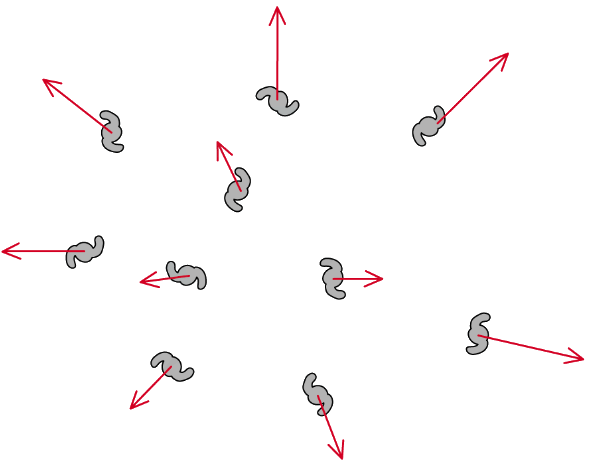Grade 10 Exam > Grade 10 Notes > Physics for Grade 10 > The Big Bang Theory, Dark Energy & Dark Matter
The Big Bang Theory, Dark Energy & Dark Matter | Physics for Grade 10 PDF Download
The Big Bang Theory
- Around 14 billion years ago, the universe began from a very small region that was extremely hot and dense
- Then there were a series of explosions, which we call the Big Bang
- This caused the universe to expand, cooling as it does so, to form the universe we currently observe
- Each point expands away from the others
- This is seen from galaxies moving away from each other, and the further away they are the faster they move
- As a result of the initial explosions, the universe continues to expand
 All galaxies moving away from each other, indicating that the universe is expanding
All galaxies moving away from each other, indicating that the universe is expanding
Evidence for the Big Bang
- By observing the light spectrums from supernovae in other galaxies there is evidence to suggest that distant galaxies are receding (moving further apart) ever faster
- These observations were first made in 1998
- The light spectrums show that light from distant galaxies is redshifted, which is evidence that the universe is expanding – the galaxies are moving away from us - and, indeed, each other
- This is what happens in an explosion
- Matter is first densely packed and as it explodes it, it moves out in all directions getting further and further from the source of the explosion
- Some matter will be lighter and travel at a greater speed, further from the source of the explosion
- Some matter will be heavier and travel at a slower speed, closer to the source of the explosion
- If you were to travel back in time and compare the separation distance of the galaxies they would become closer and closer together until the entire universe was a single point
- If the galaxies were originally all grouped together at a single point and were then exploded we would see a similar effect
- The galaxies that are moving fastest would move the furthest - the distance they move would be proportional to their speed
- The galaxies that are moving slowest would move the least
Dark Energy & Dark Matter
- Over the past two or three decades, astronomers have gathered plenty of evidence helping us to understand the universe much better
- However, there are still many observations that are still not understood, including:
- Evidence from the rotation and motion of galaxies suggests that there is much more matter in the Universe than we are able to account for
- This unseen matter is given the name dark matter and its nature is not currently known
- Measurements of the expansion of the Universe using supernovae suggest that the Universe is starting to expand at a faster rate
- It has been suggested that this accelerated motion is caused by dark energy pushing everything in the Universe apart
- If gravity is present everywhere in the Universe, it might be expected that everything will one day become closer together, but that is the opposite of what we see
- This is another reason why dark energy is a possible solution which could be counteracting gravity and expanding the Universe instead
The document The Big Bang Theory, Dark Energy & Dark Matter | Physics for Grade 10 is a part of the Grade 10 Course Physics for Grade 10.
All you need of Grade 10 at this link: Grade 10
|
122 videos|150 docs|40 tests
|
Related Searches













